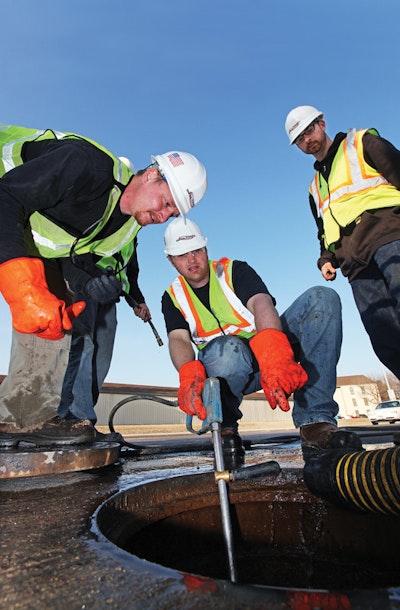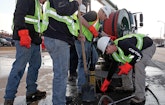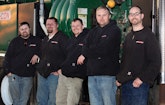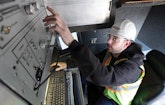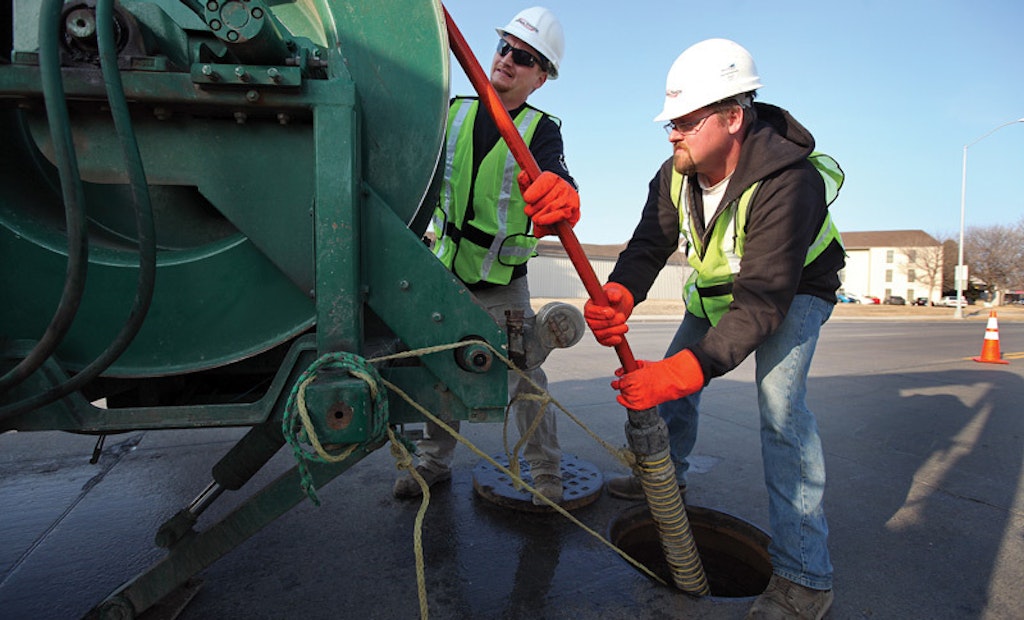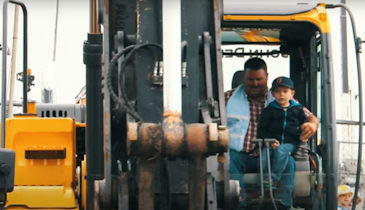Interested in Inspection?
Get Inspection articles, news and videos right in your inbox! Sign up now.
Inspection + Get AlertsAvery Zahn, co-owner of Infra-Track in Worthing, S.D., describes himself as a 30-year-old country boy who never imagined he would be building and promoting his own sewer maintenance and repair company. Still, that’s exactly where he found himself in 2010 when he founded the company with his business partner. Zahn, however, has never been afraid of a little dirt. He worked with Lakota Septic & Sewer prior to forming Infra-Track, and he and his partner purchased the company in 2011.
Infra-Track specializes in vacuuming, jetting, televising and hydroexcavation. The client list spans the municipal, industrial, commercial and agriculture sectors, with each accounting for around 25 percent of the business. It all evolved when Zahn’s father, George Zahn, who was the mayor of Worthing at the time, noted that he was having difficulty finding a company to serve the town’s sewer maintenance and repair needs. In the surrounding area there were numerous other small jurisdictions with populations ranging from 1,000 to 4,000 residents and sewers with similar requirements. Since there was no company to fill these needs in the immediate area, the younger Zahn sought out a partner, and Infra-Track emerged.
Zahn didn’t originally expect Worthing, with a population of 1,200, to be among his clients due to a perceived conflict of interest. He targeted the other local municipalities, and within a year, more clients emerged and presented further opportunities for growth. The tide even turned in Worthing, where they now handle preventive maintenance and emergency services for the municipality.
Call Avery
Infra-Track’s client list now includes two ethanol plants, 15 or more municipalities, and on the agriculture side, they tend to both hog consignments and dairy barns. A significant portion of the work with all these customers is dealing with lift stations that, in some cases, are as deep as 50 to 60 feet. Zahn’s four technicians are fully aware of how to deal with these situations, which are often emergencies, where they will be vacuuming and hydroblasting, getting rid of sludge and grease, and servicing and repairing or replacing pumps.
The business is a 24/7 operation, and Zahn estimates that at least 75 percent of their business falls into the emergency category. They deal not only with lift stations, but power outages, emergency blockages and surveys. They jet out lines going to lagoons and take care of grain elevators on the hog farms and dairy barns. Their duties are more expansive at the ethanol plants, where they clean out (hydroblast) wet wells, syrup tanks, DDG towers and lift stations. Their relationship with the plants is such that if there is something unusual going on, the response is “Call Avery.” While there are preventive maintenance contracts with municipalities, the ethanol plants and the hog and dairy people simply have a gentlemen’s agreement with Zahn.
Promoting Infra-Track in the beginning was the first important step, and Zahn took it on by personally calling on prospects. Zahn says people would often say, “What do you know? You are just a kid.” But he continued knocking on doors, visiting prospects and leaving his business card.
“We wanted to prove what we could do, and in a lot of cases I had to say, ‘If we can’t do it, I won’t charge you anything,’ ” Zahn says. “ ‘If we do it I will charge you.’ I have never let anyone down.”
With Infra-Track, emergency situations take priority as they promote their claim to respond within an hour — which means they might need to pull technicians from one job in order to handle a dire situation. Zahn says he has worked 24 hours straight on an emergency call. Along with handling the public relations, phone calls and organization, he is also there in the trenches.
Zahn started out with a 2004 International Vac-Con vacuum truck with a FMC Technologies 80 gpm/2,000 psi Triplex Bean Pump, a three-stage fan and 11-yard steel tank. He now also has a 2003 Sterling pump truck with a 2,300-gallon steel tank and Masport Incorporated pump. This functions well for duties at ethanol plants and as emergency backup when they have extra pumping chores.
For televising and inspection, the company started out with a 2006 RS Technical Services CCTV trailer unit. They’ve recently added a 2004 Polaris Ranger (UTV off-road vehicle) also outfitted with RS Technical camera equipment, giving the company off-road capabilities to access manholes in the middle of pastures and on undeveloped land. Their CCTV vehicle is a 2003 Dodge Sprinter Van 3500, and they have three RS Technical Omni Eye III cameras with pan tilt and zoom.
In mid-2013, Zahn was awaiting delivery of a second reconditioned combination truck, a 2003 Sterling chassis with a positive displacement blower and 12-yard steel debris body.
The company, located 12 miles south of Sioux Falls, operates out of two sites, a 5,000-square-foot facility on one acre in Worthing, and a 2,000-square-foot facility 20 miles away in Parker. They are also looking at another site to provide better service capabilities for the four states they serve.
Meeting customers’ needs
Hydroexcavation had been available in the area, but companies with small trailer vacuum units were offering the service on a much smaller scale. Infra-Track bolstered those capabilities with their Vac-Con truck, offering full-scale hydroexcavation for all their clients.
Offering hydroexcavation in the area was “huge,” according to Zahn. “We are doing more and more all the time. We see big companies coming in to work on line projects, and we sub-contract with them. It is important because of the minimal risk for damaging gas lines, fiber optic and other lines. We can dig a line in a quarter of the time it would take for the conventional method.”
Equally essential for their purposes is the latest in televising capability. “This helps us identify the structure of the pipe and what the customer can expect on the life of the pipe, and what needs to be done as far as preventive maintenance,” Zahn says. “It’s important or you are guessing what is underneath the ground.”
He says having a good selection of nozzles in the toolbox is essential. They buy their nozzles and root cutter saws from several manufacturers through Jack Doheney Companies.
Typically, they find clay pipe and see a lot of infrastructure in decay and in need of maintenance, repair or replacement.
While Zahn envisions his company offering additional disciplines such as relining and manhole rehabilitation in the future, they currently refer these types of projects to a company they work with out of St. Louis, Mo. Zahn then functions as a subcontractor.
“However, if the project calls for replacing the pipe, we can handle that through our excavation company,” Zahn says. “When replacing pipe we use PVC. We have a lot of options and great equipment.
“It costs so much to go into relining, we decided to stay focused on what we do best for now, and this has worked for us.”
His philosophy for purchasing equipment is not to take on a lot of debt. “We need additional equipment, we could use two more trucks and two more service techs, but we’re not going to over-extend ourselves at this point.”
Still, Zahn sees there is room to grow, and that is their plan.
“I have a lot of irons in the fire,” he says.
Tackle each day as it comes
There is no typical day for Infra-Track. They can be on a 160-acre hog consignment working on a lift station or a pump, or jetting out lines to a lagoon, or running a camera through the lines in a small municipality with 1,000 residents. The next day could be at the ethanol plant, then on a dairy farm servicing outside lines that go into the barns, or cleaning a grain elevator. There are times they have pumped from 2 to 5 million gallons of sludge at a lagoon.
Although they do not contract regularly with Sioux Falls (where they have their own equipment), Infra-Track did televise a 60-inch, 1,200-foot-long sewer main along the Big Sioux River. Zahn admits it was pretty challenging, but they made it work. They had to build an aluminum pontoon to float the camera since they couldn’t use a wheeled tractor.
“We had that job done within one day,” he says.
Of their varied projects, the most time consuming are those involving agricultural customers.
“For routine maintenance on lift stations we will be cleaning them out, getting rid of sludge and grease and all kinds of things,” Zahn says. “You name it, we have seen it. The largest lift stations are with the municipalities.
“There are always at least two guys, sometimes three on a job with the lift station for safety reasons. My guys, when they pull up to a lift station, know what they are doing. We pull up, get the vac truck set up, the hydroblaster set up. One guy will do hydroblasting, and another guy will be checking out the pumps and floats.”
The technicians are certified for confined-space entry, but seldom have to suit up when servicing lift stations, since most equipment is on the surface. Confined-space entry is also sometimes necessary in ethanol plants and grain elevators.
Rough and ready
When hiring, Zahn looks for technicians who are willing to work long hours, and people looking for a long-term future with his company. It’s important to have team players, and he remains an active part of the team. It’s also a benefit to have people who are mechanically inclined.
“I’m willing to train anyone who is going to be a team player for us,” he says. “Our guys are all about the same age, and they are willing to look out for each other and for me. I look out for them. We enjoy every day.”
Zahn says he is especially grateful for his father, George Zahn, for his faith and the work ethic he instilled, and to his business partner, Larry O. Olson, for the trust and support he has offered.
“I have put my heart and soul into the company. You would never think you would do that in the sewer business, but it’s not about sewers. It is about helping others out. My proudest moment is helping out a customer, finishing a job that everyone thought was impossible to handle. We want everyone to ‘Call Avery.’”
As he looks back on the steps he took to establish Infra-Track, Zahn says the smartest thing he ever did was continue working hard and moving forward. “I wanted to prove myself to the customers, and not give up on a job. We never let anything take us down. I had to prove myself and my young company and my young crew.”
